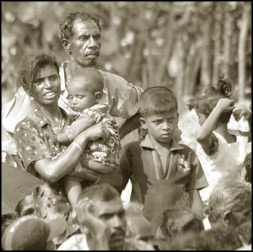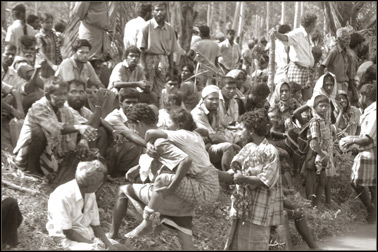|
Post-conflict phase:
Govt. working closely with UN, other agencies - Minister Mahinda
Samarasinghe
P. Krishnaswamy
 In an interview with the `Sunday Observer’ Disaster Management and
Human Rights Minister Mahinda Samarasinghe spoke about the successful
military operations, the government’s plans to resettle the IDPs in
their own villages before too long, providing them the necessary
infrastructure and all basic services as well as integrating
ex-combatants into mainstream life. In an interview with the `Sunday Observer’ Disaster Management and
Human Rights Minister Mahinda Samarasinghe spoke about the successful
military operations, the government’s plans to resettle the IDPs in
their own villages before too long, providing them the necessary
infrastructure and all basic services as well as integrating
ex-combatants into mainstream life.
Excerpts of the interview:
Q:The current influx of a large number of refugees from LTTE-held
areas of the Wanni is something that happened all of a sudden. How is
the government coping with the situation?
A: I would not say it was totally unexpected. People wanted to escape
from the LTTE. In recent times we saw quite a number of them coming
over. The LTTE made sure that no civilian was allowed to leave during
the 48-hour pause offered by the government, and I think this increased
the resolve of the people to escape in large numbers. The government has
always been in readiness to absorb a large number of refugees and, as a
result, we were able to extend to them the initial health facilities,
food and various other services which we usually extend at the time of
their arrival. They were then handed over to the respective GAs to be
taken to Vavuniya or Jaffna. From all the reports that I am getting I
can tell you that they are being looked after well. The objective is to
keep them in the welfare centres or relief villages for the shortest
possible time and subsequently resettle them in their own villages once
those villages are made safe. For the resettlement process to be
conducive and sustainable it is necessary to restore the infrastructure
and all basic services. We want to ensure that they live a life like
that of their brothers and sisters in the South.
Q:What are the other local and international resources which the
government plans of utilising to handle the situation adequately?
A: The government of Sri Lanka is taking full responsibility for each
and every citizen and, as such, even if they are not supported by the
international community we take on the full responsibility and ensure
that they are protected and well looked after. I must also acknowledge
the fact that the international community has been complimenting efforts
of the government and assisting us where ever possible. They have
clearly told us that they would continue to assist us in our endeavour
to give to these people a better future in time to come.
 |
|
AGONY AND ECSTASY... A family of
civilians, who fled the clutches of the LTTE, breathe a sigh
of relief in the safety of the troops |
While taking full responsibility, the government is also open to
getting assistance from the UN, our bilateral friends, INGOs and NGOs
who want to help us. We have been able t get a lot of help from them and
we are hopeful that we will be able to get more assistance from them so
that the resettlement can be made sustainable.
Q: What approximately is the number of civilians who have so far
arrived?
A: The total as of today (April 24) is 193,980 and those who have
come between the period of April 20 up to now is 91,224 and another
11,947 have gone to Jaffna while 656 civilians have gone to Mannar. So,
the total arrivals actually between April 20 until today is about
105,274. The difference between 193,960 and 105,274 are the IDPs who
were here before April 20.
Q: This is a historic victory for all Sri Lankans. How has the
international community and others who have been cautioning the
government, reacted to it?
A: I think we took everyone by surprise because nobody expected the
military advancement to be so rapid. Beginning of last year when we were
moving into the Wanni, there were certain friends of Sri Lanka who
thought that we were committing suicide. That was because of the
impossible task we had undertaken. In September last year we asked the
international community, the UN, INGOs and NOGs to relocate from
Kilinochchi to Vavuniya and they thought we were crazy. The
international community by and large has paid a glowing tribute to the
military in the way that they ave succeeded in defeating the LTTE. At
the same time, there are also concerns expressed by certain parties
about the way these advancements have been achieved.
We have replied to
these concerns very clearly saying that the concerns expressed about HR
violations and civilian deaths were not based on proper facts. We have
explained the real situation prevailing in those areas and there is
better understanding today as a result of it. The fact is that the Sri
Lankan Army has been very conscious of ensuring that civilians are not
caught up in the fighting and they went to great extent to ensure that
civilians were not affected in the fighting, even at their own risk of
facing heavy casualties. The army ensured that their heavy guns were not
used so as to avert civilian casualties in the final confrontation.
 |
|
SOLACE FROM BRUTALITY... Civilians
brutalised by the LTTE in the safety of the Security Forces |
Q: Do you observe any marked change in the approach of the UN and
other international communities after the military victory and the
influx of civilians to government controlled areas?
A: UN response, in terms of wanting to assist us, has been quite
positive because they appreciated us very much. There is a role for the
UN in the post-conflict phase because we would like to work with the UN
in the resettlement process of this large population in their respective
villages. We want to work with the UN in terms of addressing their
livelihood issues so that their resettlement can be made sustainable. We
would also like to work with our bilateral friends to put in place an
accelerated development programme in these areas so that these people
will have better economic services and social services. The whole host
of things in the post-conflict phase could be done in partnership with
the UN and others. So, now we are looking at the possibilities of
discussing these things with them.
Even the reintegration of ex-combatants is an area that needs to be
looked at in the post-conflict phase. We are now working very closely
with the UN and other bilateral partners in getting their assistance. I
definitely see a very strong relationship emerging even in the future
between the UN and the government of Sri Lanka. |

